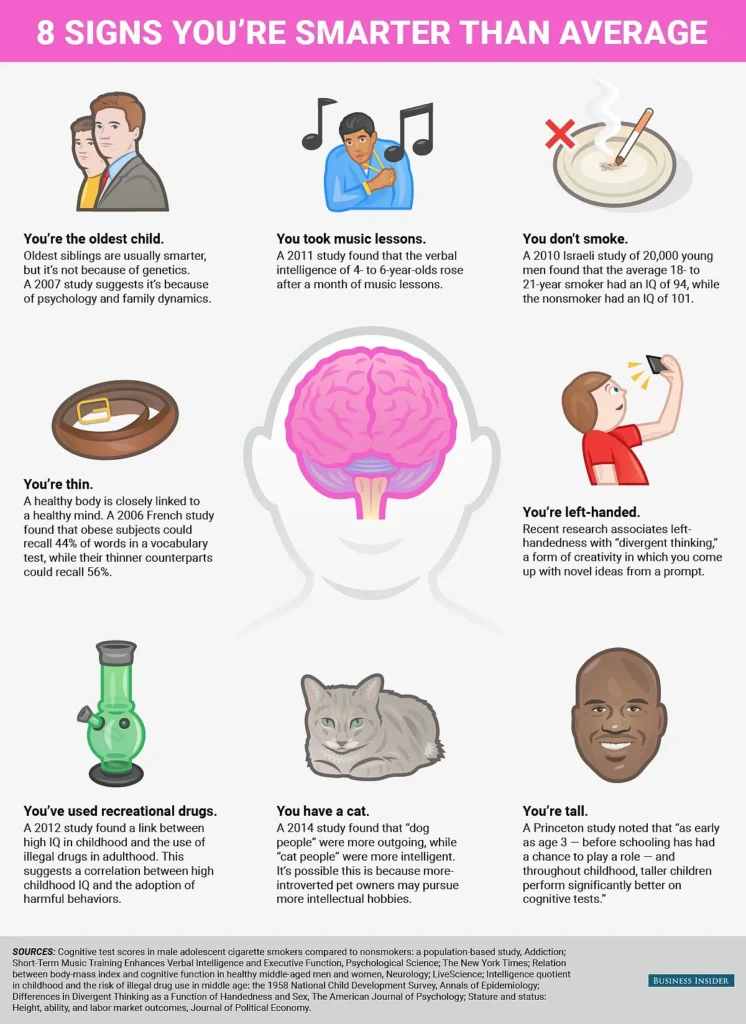Have you ever found yourself surrounded by friends or colleagues, effortlessly providing answers while others ponder the question at hand? If this scenario resonates with you, it may be a sign that you’re the smartest person in your circle — and you might just relish that role. From predicting movie twists to feeling exasperated by small talk, your intellectual prowess comes with its own set of quirks and challenges. In this exploration, we’ll delve into 15 telltale signs that highlight your unique brand of brilliance, all while emphasizing the importance of staying humble and open-minded in your journey of knowledge.
| Sign Number | Description |
|---|---|
| 1 | You frequently explain things to others, enjoying being the one with answers. |
| 2 | You can predict movie endings quickly, spotting twists early. |
| 3 | You overthink situations, analyzing everything deeply. |
| 4 | People often seek your opinion, trusting your judgment. |
| 5 | You find small talk boring and prefer deep discussions. |
| 6 | You love learning for fun, exploring new topics and ideas. |
| 7 | You feel frustrated when others don’t understand things quickly. |
| 8 | You mentally correct people’s grammar, even if you don’t say it. |
| 9 | You question everything, seeking to understand how and why. |
| 10 | You find it hard to meet people who challenge your intellect. |
| 11 | You dislike being wrong but acknowledge it when you are. |
| 12 | You have a strong curiosity and an endless thirst for knowledge. |
| 13 | You struggle to relax as your mind is always working. |
| 14 | You enjoy well-structured arguments and intellectual debates. |
| 15 | You may not seek to be the smartest, but you usually are. |
The Joy of Explaining
If you often find yourself explaining things to friends and family, you’re likely someone who enjoys sharing knowledge. Whether it’s about science, history, or even the latest tech gadget, being the go-to person for answers feels rewarding. It’s like being a teacher in a fun way! You help others understand complex ideas, which not only helps them but also strengthens your own understanding.
However, always being the explainer can be tiring. Sometimes, you might wish that someone else would step up to the plate and take charge of the explanation. It’s not that you mind helping out—far from it! But every now and then, it’d be nice to sit back, relax, and just enjoy the conversation without having to break everything down.
Frequently Asked Questions
What are the signs that you’re the smartest person in your group?
You often explain things, predict movie endings, and people frequently ask for your opinion. You love learning and crave deeper conversations.
Why do I overthink everything?
Overthinking is common for intelligent people. It helps you analyze situations but can also be mentally exhausting.
What should I do if I feel frustrated with others’ understanding?
Practice patience and remember that everyone learns at their own pace. Try to help them without feeling superior.
How can I enjoy learning without feeling overwhelmed?
Set aside time for enjoyable learning activities, like hobbies or documentaries, that spark your curiosity without pressure.
Is it okay to correct people’s grammar?
While it’s tempting, be mindful of when to correct others. It’s best to do it gently to avoid sounding rude.
How can I find people who challenge my thinking?
Seek out clubs or discussion groups related to your interests. Engaging in debates can help you meet like-minded individuals.
What if I hate being wrong?
Recognize that everyone makes mistakes. Embrace them as learning opportunities rather than failures.
Summary
If you often feel like the smartest person in your group, you might notice several tell-tale signs. You love explaining things, predict movie endings early, and find small talk boring. You enjoy learning for fun, question everything, and get frustrated when others don’t understand quickly. While you tend to overthink and correct grammar internally, you also admit when you’re wrong. Your endless curiosity drives you to seek deeper conversations and well-structured debates. Ultimately, being smart is about more than just knowledge; it’s about a desire to learn and grow.

